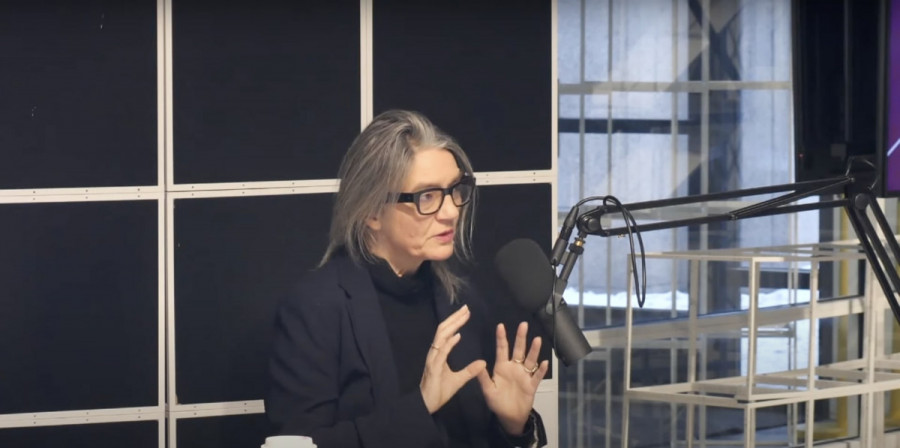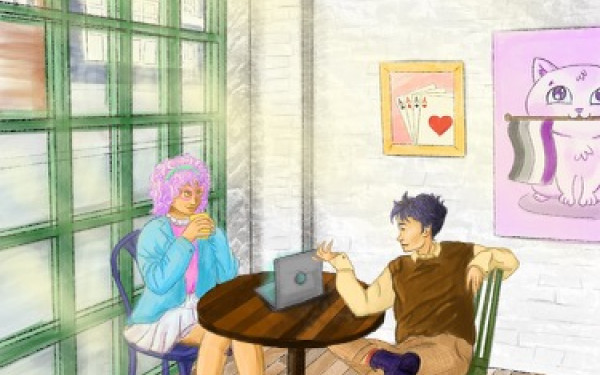Sina Queyras talks Virginia Woolf and occupying creative spaces
One Love, Literary Podcast returns for conversation with Concordia professor
On Jan. 13, 4th Space Concordia held a live episode of One Love, Literary Event/Podcast with host Olga Tsygankova and writer and poet Sina Queyras.
Tsygankova, a Ukrainian MA student in English and former student of Queyras’, spoke with the award-winning writer. In discussion was Queyras’ book Rooms: Women, Writing, Woolf, a hybrid memoir exploring their relationship with Woolf’s creative legacy. Published last year, Queyras thought this timing was uncanny: “I am the age Woolf was when she ended her life,” they disclosed in conversation.
Much referenced throughout the episode was Woolf’s extended essay, A Room of One’s Own. Here, Woolf advanced the thesis that "a woman must have money and a room of her own if she is to write fiction."
“It’s taught all across universities now,” said Queyras of Woolf’s work. “It’s not just taught in English departments […] I think [it’s] even in business now.”
Audience member Aimee Li, who majors in Business at McGill, noted that Woolf’s essay remains as relevant as ever. “There isn’t enough room for self-definition and expression in business circles, but it’s getting better, and I’m grateful to be able to attend talks like this one outside of those circles,” she said.
Queyras mentioned in discussion that they wouldn’t have a writing career without having discovered Woolf. “She was the first true reflection of myself in a larger more meaningful literary possibility. She gave me a lifelong trajectory that I still chase,” they explained. “It’s named after her, it’s her book. I brought myself in because I was writing about her.”
Woolf’s impact on Queyras was evident at many points throughout the discussion. “I think back to being an undergraduate in 1989 and those sentences just stepped so far outside what was comfortable for me that they just allowed me to catapult,” they professed.
Tsygankova asked about an early academic experience of Queyras’ regarding a professor by the name of Norton. A chair was thrown at Queyras by Norton after they had turned in a lyric essay on Woolf. “I did not write a conventional essay […] he wanted me to write a conventional essay,” they explained. Queyras received a B, describing it as “a shut up B. He didn't want to deal with me or with it, he just wanted to erase it because it was too complicated for him.” Speaking on the violence inflicted, they added, “I didn't even tell anybody at the time. I just felt really awful.”
Despite this, Queyras expressed hope for the future of academia. “I’m pretty excited for my students. They’re facing existential crises in every direction, but they also have spaces to create in every direction.”
Queyras mentioned their reading series, Writers Read, as an example of one such space. “We have like 8-10 events a year and those spaces are really amazing,” they told The Link. Queyras also spoke on creating more metaphorical rooms and creative spaces. “If you don't see them, then I would recommend creating them. Try to demand departmental support for creating those spaces because those events should happen.”
Queyras believes Woolf would think positively of the state of academia today. “I think she’d be really thrilled with the difference [since her time]. When I was first reading [her work], it was really kind of impossible to imagine queer spaces in a university. Now, we’re getting non-binary bathrooms put in the institution. That’s amazing. It would blow her mind, I think,” they said.
Tsygankova also spoke on the current academic environment. “Things are not perfect yet, but I feel like they have been shifting,” she said. She mentioned that more women have been hired in the English department, and that more effort is being made to produce real change.
Similarly, Tsygankova voiced her support for Concordia’s creative rooms and spaces. “Personally, I adore Concordia as a space. 4th Space is amazing because it’s so modern. But of course there is always room for improvement.”
The discussion ended with Queyras’ advice to writers of all levels: “I highly recommend falling in love with a writer who’s unattainable. You’ll always be reaching up there.”


_600_832_s.png)




